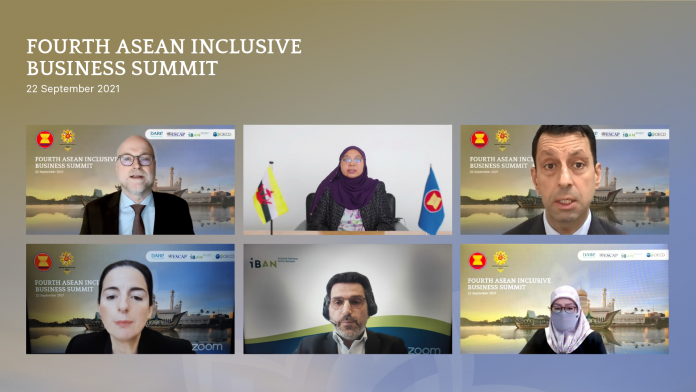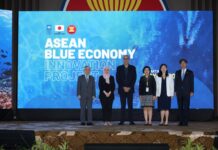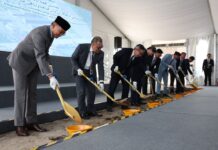
Emerging policy frameworks, strategies, and success stories of inclusive businesses across the region were showcased at the Fourth ASEAN Inclusive Business Summit, held virtually on September 22, 2021, in conjunction with Brunei’s ASEAN Chairmanship 2021.
The summit was organised by Darussalam Enterprise (DARe) in collaboration with the United Nations Economic and Social Commission for Asia and the Pacific (ESCAP), Inclusive Business Action Network (iBAN), Organisation for Economic Co-operation and Development (OECD), and the ASEAN Secretariat.
The one-day summit brought together over 150 leading public and private sector representatives from ASEAN and beyond to discuss how to realise the potential of inclusive business in the region to build back from the COVID-19 crisis.
The progressive implementation of The Guidelines for the Promotion of Inclusive Business in ASEAN, the regional bloc’s foremost recommendation for the sector’s development, was a central focus of the summit.
These guidelines build upon the ASEAN Inclusive Business Framework and serve as a reference document for ASEAN policymakers of how inclusive business can be set up and supported at national and regional levels.
Inclusive businesses are defined as enterprises that provide goods, services, and support livelihoods on a commercially viable basis to people living at the base of the economic pyramid; making them part of the value chain of companies as suppliers, distributors, retailers or customers.
The summit deliberated on two core measures suggested under inclusive business guidelines: the establishment of an inclusive business accreditation and registration system; and the provision of business coaching services for firms to develop inclusive business models.
In her opening remarks, Permanent Secretary (Industry) at the Ministry of Finance and Economy (MoFE) Pg Hjh Zety Sufina Pg Dato Paduka Hj Sani said the summit’s theme ‘Building Inclusive Businesses to Build Back Better’ is in line with this year’s ASEAN Chairmanship theme of “We Care, We Prepare, We Prosper” and reflects the potential of the sector’s innovative models to address challenges posed by the ongoing COVID-19 pandemic
“As a result of efforts to promote inclusive business at a national level, ASEAN member states are actively engaging in inclusive business policy development and capacity building to better understand the inclusive business concept and approaches among its policy makers and businesses,” she said.
Inclusive business gathers ground in Brunei
Pg Hjh Zety also shared the progress of inclusive business in Brunei. Though poverty in the Sultanate is marginal, there has been a growing trend of social entrepreneurship and corporate social responsibility initiatives that incorporate elements of inclusive business in addressing social challenges such as unemployment and assisting vulnerable groups including low-income families and single mothers.
The government-owned food and beverage company Ghanim International Corporation has working with close to 20 small and medium enterprises to market over 80 products under their Brunei Halal brand to be supplied to local and international markets.
Ghanim CEO Dr Nur Rahman added that during the outbreaks of COVID-19 in Brunei in March last year, and again in August this year, the company has acted as a distributor of local fruits and vegetables by purchasing from farmers and market vendors who had difficulty marketing their products during the pandemic.
The Buy Local Produce campaign has engaged more than 32 growers and supplied their produce to different grocers including Ghanim’s own Junction retail stores. The Junction franchise offers Bruneians the opportunity to run their own convenience stores.
The Yayasan Sultan Haji Hassanal Bolkiah (YSHHB) foundation has also set up a committee to help social enterprises tackle unemployment and poverty in the country. The committee’s chairperson YB Nik Hafimi Abd Haadii said local social enterprises have been given the opportunity to pioneer community development projects such as the Kg Bolkiah Community Development Centre to help residents become more independent through self-employment.
Three parallel sessions were held as part of the summit with panels of leading experts covering topics such as coaching businesses to be more inclusive, accreditation and registration of inclusive business models, and the sharing of emerging and successful inclusive businesses.
As part of efforts to continuously promote inclusive business, the ASEAN SME Academy, a regional-focused online learning platform, will be offering a module on inclusive business. The ASEAN Business Awards in November this year will also feature an Inclusive Business Award that will recognize ten enterprises that have excelled in helping the lowest income members of society.
The Summit is an activity of the ASEAN Coordinating Committee on MSMEs (ACCMSME), the sectoral body under the ASEAN Economic Community (AEC) pillar coordinating MSME development, and contributes to the implementation of the ASEAN Strategic Action Plan for SME Development 2016 – 2025.











